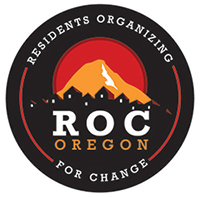Priorities
Residents Organizing for Change (ROC) is a statewide network of residents of affordable housing, those in need of, and front-line staff of affordable housing providers that are committed to advocating for safe, stable, and affordable housing for all Oregonians.
Every year, ROC considers and adopts advocacy priorities through our Steering Committee, and meetings with ROC members.
2025 ROC’s Advocacy Priorities:
Budget asks:
Emergency rent assistance
$109.7M general funds
Homelessness prevention services
$63.5M general funds
HB 3644 A: Statewide shelter program. Requires the Housing and Community Services Department to establish a statewide shelter program through which regional coordinators are selected to administer funding to shelter providers. $217.9M general funds
SB 722: Reduce the new-construction exemption from rent stabilization from 15 years to 7 years; prohibit landlords’ use of price-fixing algorithms to set rents
SB 973: Strengthen notice requirements for residents of expiring affordable housing
SB 31 A: Mitigation fund to support residents of expiring affordable housing
ROC members strongly support: SB 599 A: Prohibits landlords from inquiring about or discriminating on the basis of a tenant’s or applicant’s immigration or citizenship status,rejecting an applicant.
SB 611 : Establishes the Food for All Oregonians Program in the Department of Human Services to provide nutrition assistance to residents of this state who would qualify for the federal Supplemental Nutrition Assistance Program but for their immigration status.
In 2023, we’re advocating for these priorities:
Reporting on Racial Disparities in Homeownership (HB 3488): Racial disparities continue to exist in homeownership as communities of color are disproportionately more likely to rent rather than own their own homes. Direct OHCS, the Bureau of Labor and Industries (BOLI), and the Department of Consumer and Business Services (DCBS), with assistance from the Fair Housing Council of Oregon (FHCO) and any other state agencies as necessary, to deliver a joint report to the Legislative Assembly committees related to housing and the Racial Justice Council by September 15 of every even-numbered year. Report shall include progress made on the recommendations of the Task Force, and other measurable progress in reducing the disparities in homeownership by communities of color in Oregon
Special Purpose Credit Program (HB 3492): There is a disparity in access to homeownership opportunities among people who have Individual Taxpayer Identification Numbers. This proposal will create a pilot program within OHCS to provide 100% of the function of the home purchase price through a special purpose credit program loan product within the OHCS Flex Lending Program. Asks for a $30 million budget allocation.
Oregon Kids’ Credit (HB 3235): This is Oregon’s permanent version of the popular Child Tax Credit that would create a refundable $1,200 tax credit available to every Oregon family that meets income requirements. The full credit will be available to families making up to $40,000 in adjusted gross income for joint filers, before gradually phasing out.
Reasonable Rent (SB 611): Because of extreme inflation, the allowed rent increases covered by SB 608 (passed in 2019) are unreasonably high. This bill will limit annual rent increase to 3% plus CPI, or 8%, whichever is lower; expand protection to include all buildings more than 3-years-old (current law exempts buildings up to 15-years-old); increase relocation assistance in landlord-based cause (no-fault) evictions.
Protections for residents of housing with expiring affordability restrictions (HB 3042): Every year Oregon loses some of our federally subsidized and rent-restricted affordable housing. This bill will improve our chances of preserving more of these expiring properties, and will provide modest tenant protections for those that convert to market-rate housing.
Tax credit for preservation of regulated affordable housing (HB 2653): This bill will create a new tax credit to incentivize private owners to sell their rent-restricted property to an affordable housing provider who agrees to preserve it. An owner would receive a tax credit which could be used to offset their capital gains after the property has been sold to an affordable housing provider who commits to maintaining affordability for an additional 30 years. The credit provides a modest but effective incentive to encourage owners to consider selling their property to a buyer who will preserve it, rather than converting it to market rate housing
Housing Omnibus Bill (HB 2001):
- Oregon Housing Needs Analysis: Oregon Housing and Community Services will be required to conduct an annual housing needs analysis, consisting of statewide and regional estimates of: existing housing, currently needed housing, vacant housing, current housing underproduction, and anticipated housing needs for the next 20 years (segmented by median family income), including housing for those experiencing homelessness. OHCS will then establish housing production targets for cities over 10,000 in population, also segmented by MFI, and will establish a public dashboard and equity indicator to track each city’s progress.
- Emergency Housing Assistance for K-12 students: Oregon has one of the largest populations of homeless students in the country. This bill would modify the state’s emergency housing assistance (EHA) program and state homeless assistance program to provide services and assistance to school-aged children experiencing or at risk of experiencing homelessness.
- Eviction Reform & Reduction: Oregon’s eviction crisis remains, this bill will ensure people have enough time to get rent assistance and other help if they are late on rent and solves the problem of some landlords refusing to accept rent payments. It will restore reasonable Safe Harbor protections and amend fast-track eviction timelines so tenants can access intervention services and pay rent that they owe to remain housed; protect against unfair default eviction judgements; streamline existing eviction expungement protections.

